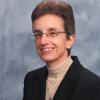Several years ago I was a Senior Fellow at Woodstock Theological Center working on questions in science and religion. One day the program manager appeared at my door and asked if I wanted some boxes of notes that had been taking up space in his office. The notes happened to be those of Pierre Teilhard de Chardin and he did not know what to do with them. Woodstock had inherited the notes from Nicole Schmitz-Moorman whose father, Karl Schmitz-Moorman, inherited the notes after Teilhard’s death. Karl bequeathed the notes to his daughter who, in turn, donated them to Woodstock. The notes are type-written pages, hundreds of them.
Teilhard’s thoughts were like millions of burning stars over the great expanse of the cosmos. Sometimes his thoughts coalesced into diagrams and formulas to which he would add words and arrows, revealing his brilliant mind plumbing scientific discoveries, scanning world events, and weaving all into his deep Christian convictions, striving earnestly to form a grand synthesis of science and religion.
Recently, I was in conversation with my friend Martine Rothblatt, founder of Sirius Satellite Radio and United Therapeutics, and author of Virtually Human: The Promise – and Peril – of Digital Immortality, and mentioned that I had Teilhard’s notes. Martine is a “Teilhardian” and was thrilled by this revelation. She offered to digitize the notes for me so they could be safely preserved. I now have four boxes of Teilhard’s notes on a thumbdrive and last week downloaded them to my tablet so that I could slowly ponder his incredible quantum thoughts.
As I was scrolling through the notes, I was delighted to see this phrase, “Le toujours Noveau Dieu,” God is always new. I was immediately struck by Teilhard’s words because I have been pondering the newness of God for quite some time. Teilhard realized that God does not simply do new things but God is always new. The Dominican mystic Meister Eckhart had a similar insight several centuries ago when he wrote: “God is the newest thing there is, the youngest thing there is. God is the beginning and if we are united to God we become new again.”
The idea of God as newness strikes our Aristotelian genes as strange because we are tempted to think of God as absolute Being or Being itself, in which existence prevails over newness. But what Teilhard seemed to realize is that newness is the basis of existence. God is not so much “Being in itself” as “Newness in itself.” The name “God” undergirds every new beginning of life and hence the newness of God is always “future” and “promise” or as the Hebrew translation of Exodus 3:14 states, “I will be who will be there.” I think Gregory of Nyssa embraced something of this idea when he said that one who follows God never beholds the divine face because God is always up ahead with his divine back to us, the incomprehensible future of Life whose dynamic future presence constantly transforms our static moments into insatiable longings.
Teilhard perceived an entangled presence of divine newness with Big Bang evolution which he called “God-Omega” and spoke of evolution as a dynamic process of creativity, novelty and future. At one point he wrote, “The whole universe rests on the future as its sole support.” That is, the universe rests on the eternal newness of God. Theologian Paul Tillich said that divine life and divine creativity are one and the same thing. The divine life is essentially creative and actualizes itself in inexhaustible abundance. God is always new; life is always new. Every end is a new beginning and every arrival, a new departure. There are no dead ends in life unless we ourselves die in despair.
Teilhard’s insight on divine newness undergirds the virtue of hope, especially in a world that knows so much violence, hatred and division. As creatures in evolution, we are not defined by our divisions but by our creativity and openness to deepened relationships and more unified life. The monotheistic faiths still linger with Aristotle; they are still enamored with “being” and “substance,” “matter” and “form.” Many mystics throughout the centuries, like Teilhard, however, seem to dispense with scholastic constraints.
Rather than deciphering philosophical arguments, God is simply love or love-energy; love that is absolutely self-communicative, other-centered, intrinsically relational, utterly faithful and always new. Teilhard said that theology has thought of God too much in terms of a prime mover moving things from the past. Evolution impels us to think of God as drawing the world from up ahead; God is the power of the future. Hence, God cannot be defined by the past, only by the future because God is ever newness in love.
If religions are to contribute to a more unified, just and peaceful world they must do so by creating a new future together. Can we imagine a new type of religious being or new forms of religious life or perhaps new religion itself? In a world of quantum possibilities and an expanding universe, future has an endless horizon. The religious dimension of our existence is simply the deep, intrinsic longing for absolute unity, beyond heaven and earth, a stretching forth into the incomprehensible love-energy that is God. How we harness this energy for a deepening of life ahead is the religious question of our age. It takes an inner freedom born of grace to let go into the new but the new is God and God is future. We are called to a radical trust in the future.
[Ilia Delio, OSF, a Sister of St. Francis of Washington, D.C., is Haub Director of Catholic Studies and Visiting Professor at Georgetown University. Her recent publications include From Teilhard to Omega: Cocreating an Unfinished Universe and The Unbearable Wholeness of Being: God, Evolution and the Power of Love.]
